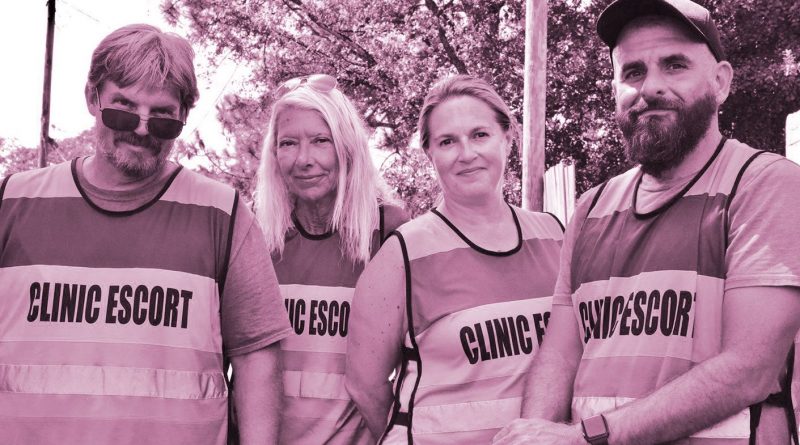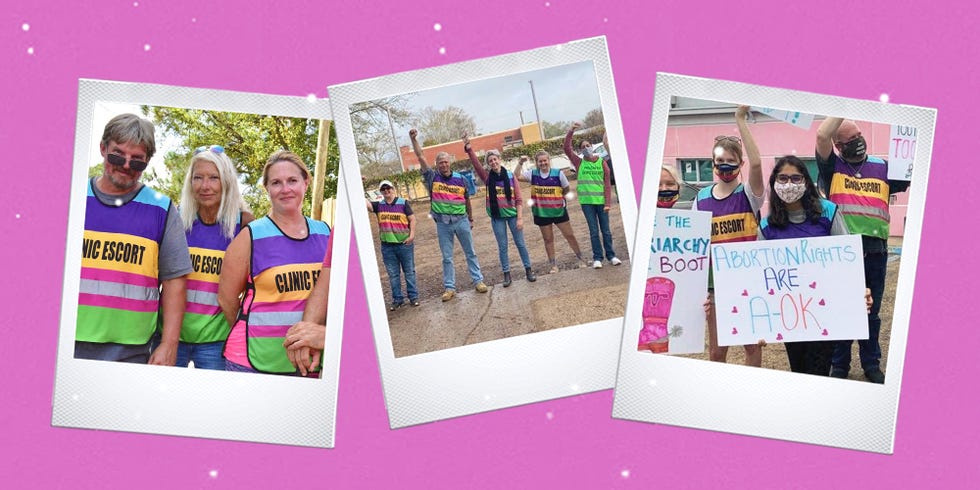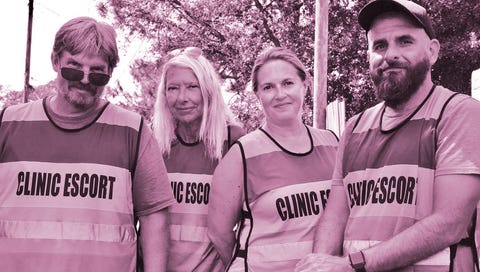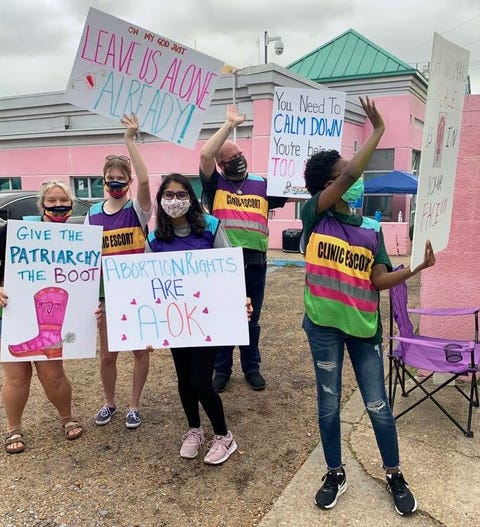On the Front Lines With the ‘Pinkhouse Defenders’ at Mississippi’s Last Abortion Clinic
It was a typical, swampy April day in Jackson, Mississippi in 2017 when Derenda Hancock noticed a car quickly turn towards the front door she was guarding. By then, she’d already spent four years as the leader of the “Pinkhouse Defenders,” the clinic escort group that protects the Pepto-Bismol walls of Jackson Women’s Health Organization (JWHO), the last remaining abortion clinic in Mississippi. Lovingly dubbed the “Pinkhouse” by supporters, Hancock embraced the clinic as her home away from home.
She eyed the car barreling towards her, confused. Patients at the Pinkhouse enter in groups at select times. The cutoff for the 8:00 a.m. round of patients was 8:30, and it was now 8:47. If this was a patient, they were incredibly late.
“Do you have an appointment?” Hancock asked, peering into the driver’s side window. “Yes ma’am,” the driver replied. He gestured to the woman in the passenger seat. “It was at eight o’clock but we had a flat on the way here.”
“Did you call the clinic to tell them you’re going to be late?” Hancock asked. “No ma’am,” the woman in the passenger seat responded. “My phone’s dead.”
The young couple had driven more than two hours from the Mississippi Delta to get to the Pinkhouse that morning. Their two small children sat quietly in their car seats in the back. Hancock knew that if they weren’t seen today, they likely weren’t going to be seen at all. The clinic was booked solid for weeks.
Kim Gibson, a new member of the Pinkhouse Defenders, raced inside to alert the staff. Gibson had joined the team in the aftermath of Donald Trump’s election, and while she was new to the role, she already knew the dire realities that many of the Pinkhouse patients faced. The clinic often tries to accommodate patients from the Delta because of the long distance and abject poverty that its residents face.
“Hurry! They’ll take ’em!” Gibson cried from the front door. Hancock leaned into the car and told the couple that the clinic would still get them in for an appointment, but they had to hurry. “I just need a minute,” the woman responded. Hancock could feel the seconds tick by. She heard the protesters begin to buzz anew.
She glanced over and saw the couple frantically digging through the car’s console and the glove box. Hancock panicked—what was she grabbing? If the woman had forgotten her ID, there was nothing the staff could do—she couldn’t have an abortion.
Minutes went by. Gibson gave Hancock a look and pointed at her watch. They had to go and they had to go now. “Excuse me, y’all, but we gotta get you inside or they’re not going to take you,” Hancock pleaded. The woman nodded and finally jumped out of the car. They began to walk toward the door, the sound of protesters filling the air around them. There was no music playing; it was the down period, between patient entrance and exit shifts. The woman was bombarded with cruel pleas and insults.
“We’ll help you! You don’t have to commit this grave sin!” “Murderer! Murderer! Murderer!” They were almost to the door when the woman stopped.
“Ma’am?”
“Yes?” Hancock whipped around, trying to suppress her own exasperation.
“Will they take one forty-nine?”
“Excuse me?” Hancock asked.
The woman slowly opened her hand to reveal a wad of crumpled bills and a stack of coins on top. “Will they take a hundred and forty-nine dollars? I’m a dollar short.” This woman and her partner had driven more than 150 miles, half of it on a spare tire, just to get here. She scrounged everything she could find—a few dollars from neighbors, quarters from under the car seat—in the hope that it would be enough to afford a legal health care service in her home state.
Hancock stopped. It was like the wind had been knocked right out of her gut. She took a breath. “Sweetheart, I’m sure they will,” she responded with her usual cucumber calm. “But let’s just avoid that.” She pulled a dollar bill out of her pocket and placed it in the patient’s hand. The woman let out a small sigh. “Thank you so much, ma’am.”
“Come on, sweetie, we gotta get you in,” Hancock responded. She walked the woman inside, closed the door, and then turned to head back out onto the sidewalk.
“You don’t have to murder your baby!” “Your baby’s blood is on your hands!” “You have other options! You don’t have to commit murder!”
Hancock closed the door behind the woman and whipped around. She glared at them, an all-white group of protesters, screaming at this young woman who had sacrificed everything to be here. “You okay?” Gibson asked Hancock. She assumed yes. Hancock was always okay.
“No. I need a minute.” Hancock walked behind the clinic, away from the protesters and the people, and started to sob. She wept, alone, for the next twenty minutes. She thought of this woman, who was barely lucky enough to be seen today, and she knew that she wasn’t done. In Mississippi, abortion patients are required by law to wait 24 hours between their first visit and the second visit when they can have an abortion, an unnecessary and paternalistic requirement designed to make getting an abortion a little bit harder for folks just like the one Hancock had helped. This young woman would have to come back for another visit just to have the procedure. And she knew that with the state of their car and their limited finances, the likelihood of that wasn’t high.
A week later, Hancock was back on the sidewalk, ushering in another 8:00 a.m. cohort of patients. The clinic was slammed that day—dozens of patients were filing in through the bright pink doors. While helping another patient, she glanced over and saw that same young woman, back for her second appointment. She had made it back for her second appointment. She was going to have an abortion. She was going to be okay, for today anyway.
When Hancock recounted that story to me in the summer of 2019 for my book Bodies on the Line: At the Front Lines of the Fight to Protect Abortion in America, she was still emotional thinking about that young couple. This, of course, was before the coronavirus pandemic, before Amy Coney Barrett replaced Ruth Bader Ginsburg on the Supreme Court, before her own clinic was at the center of a Supreme Court case, Dobbs v. Jackson Women’s Health Organization, that will likely result in the end of Roe v. Wade.
Hancock and I talked again recently, joined by her fellow Pinkhouse defender Kim Gibson. Our conversation, which lasted nearly an hour and a half, felt like an Irish funeral. Gibson and Hancock both recalled the patient who needed an extra dollar, and they detailed how the struggle for abortion access has become more dire for the patients they serve in recent years as the states around them, like Texas, have implemented increasingly oppressive abortion bans like SB8.
What struck me most was how they spoke openly about their fears and frustrations in the face of what, to them, now feels inevitable—the closure of their clinic and the end of legal abortion in their state. By the end of June, their clinic could potentially be shuttered. Every day could be closer to their last, and they know what that means for the patients they serve—farther to travel, more barriers to overcome, fewer options to safely terminate a pregnancy.
“I’m feeling nostalgic,” Hancock lamented. “I’ve been [a Pinkhouse Defender] for nine years and I don’t know if I’ll be there next year. That’s so messed up, because our goal is hopefully that one day we won’t be needed and we won’t need be there, but not for this reason.”
Amid their grief was a defiance I recognized all too well from my reporting in Bodies on the Line, a spirit of “Hell no, we won’t go” that fueled the emergence of clinic escorting and defense in the first place. The fate of the Pinkhouse is no longer up to the defenders like Hancock and Gibson, but their refusal to go quietly into the draconian night can serve as a reminder to us all that there is always work to do to mitigate suffering. Regardless of what happens in Dobbs v. Jackson Women’s Health Organization, even if Roe v. Wade is overturned, we all still have a role to play.
“It’s called ‘hope for the best, prepare for the worst,’” Gibson said defiantly. “We’ll be there till the end, absolutely.”
Adapted from Bodies on the Line: At the Front Lines of the Fight to Protect Abortion in America. Copyright © 2022 by Lauren Rankin. Published on April 5, 2022 by Counterpoint. Reprinted with permission.
This content is created and maintained by a third party, and imported onto this page to help users provide their email addresses. You may be able to find more information about this and similar content at piano.io





